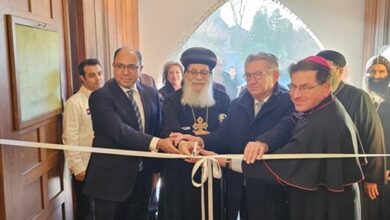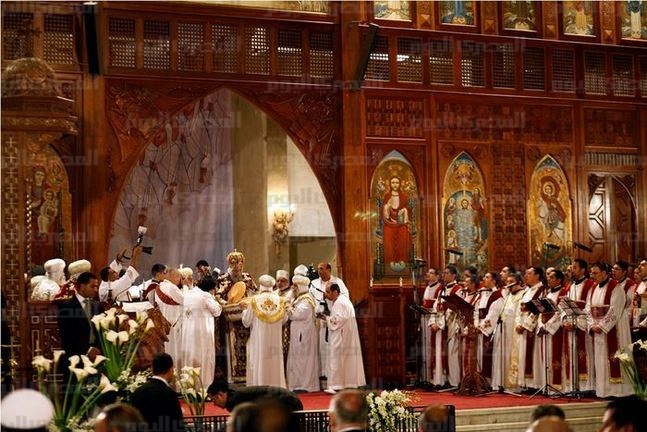It’s not easy to predict who’s going to succeed Pope Shenouda III and be enthroned as the 118th Pope and Patriarch of Alexandria and All Africa on the Holy Apostolic See of Saint Mark the Evangelist.
Some argue that the balance is in favor one of three possible candidates. They are Bishop Bishoy, Bishop Moussa and Bishop Youanis.
The three names have been prominent in the media in recent years, suggesting possible roles for them in the future leadership of the Copts, who constitute 10 percent of Egypt’s population.
Bishop Bishoy, whose official title is Metropolitan Bishop of the Holy Metropolis of Damietta, holds a stronger position as the secretary of the church’s highest religious body, the Holy Synod of the Coptic Orthodox Church. He is one of the most senior members in the synod, and seniority is a pivotal factor in the traditions of the Coptic Church.
Bishop Bishoy used to be a popular clergyman who was regularly quoted and interviewed by newspapers. But two incidents forced him to hole up. In a lecture in 2010 he challenged the authenticity of certain verses of the Quran, which caused uproar within the country’s Muslim majority.
The late Pope Shenouda III appeared on state TV and apologized for the statements, but later on Bishop Bishoy fueled the anger by saying that Egyptian Muslims are only guests in Egypt.
Because of the anger he stirred up, some may argue that he is not the best choice. But others might hail him as the first Coptic clergyman to publicly challenge Muslims.
Yet an ecclesiastical issue might challenge Bishop Bishoy: he has a diocese and according to church tradition he is therefore not entitled to the post.
The second candidate is Bishop Moussa, the general bishop and administrator for the bishopric of youth affairs. Bishop Moussa is widely popular among Coptic youth.
Some believe that Pope Shenouda III chose him for the post in order to boost relations between the church and the younger Coptic generation. Moreover, Bishop Moussa maintains strong relations with most political and social forces in the country.
The third candidate is Bishop Youanis, who holds the post of assistant bishop and patriarchal secretary at the Patriarchal Residence in Cairo.
Bishop Youanis is believed to be trustworthy and close to the pope, especially in his last days.
However the above is sheer speculation, because the decision lies in the hands of those who will vote to choose the next pope. So what matters to the electorate — whether keeping the unity of the church and its connection to the young generation or advancing the relation with Muslims — will be the indicators of how the next pope is chosen.
How is the pope selected?
According to Coptic Church traditions, detailed by a presidential decree in 1957, there are three main groups that will jointly elect the pope.
The first and most important is the Holy Synod of the Coptic Orthodox Church. This body is the highest religious authority in the Coptic Church. Some estimate its membership to be around 100 to 150 clergymen serving in Egypt and abroad. They cover 10 metropolises and 54 dioceses, with 36 diocesan bishops and two missionary bishops (in Africa).
For this reason, other potential candidates who are more senior than Bishop Bishoy, Bishop Moussa and Bishop Youanis might stand and be elected.
Notable members of the Holy Synod include Metropolitan Mikhail of Assiut, the most senior elder metropolitan archbishop (born in 1911), and Metropolitan Abraham, the archbishop of Jerusalem. Metropolitan Mikhail can’t run for the post since he also has a diocese.
The second institution is the Millet Council, established in 1874. It currently consists of 24 elected members, including some women. This secular body is responsible for administrative and organizational matters in the church. Like the Holy Synod, it was also chaired by Pope Shenouda III. Notable businessman Tharwat Bassily is the general secretary of the council.
In addition to those two bodies, there is a wide and heterogeneous body stipulated in the presidential decree of 1957. It consists of Coptic current ministers and former ministers, Coptic MPs and former MPs, 72 businessmen from Cairo and 24 businessmen from Alexandria, as well as senior Coptic journalists.
It’s hard to figure out right now the real number of voters, but according to Article 10 of the presidential decree, their names should be announced and published in three Egyptian daily newspapers.
Who’s eligible to run for the post?
The presidential decree set certain criteria, such as being a Coptic Egyptian who is at least 40 years old (when the post is vacant). He should have led a monastic life for at least 15 years, either as a monk, priestmonk or general bishop. Those with a diocese are not entitled to run.
A 19-member committee is set to receive the candidates who nominate themselves for the post. The committee is presided over by the place holder of the throne and has nine members from the Holy Synod and nine from the Millet Council. The committee should be formed within a month from the date of the post’s vacancy.
Hopefuls should register their names with the committee, along with recommendations from six members of Holy Synod or 12 members of the Millet Council.
The council then has two weeks to finalize the list of candidates. The committee is obliged to announce a list of at least five candidates and a maximum of seven.
Another two weeks are set for announcing the candidates. Afterward, in the following month, a date for elections is to be set.
In the elections, the three finalists' names will be put in a draw and a blindfolded child will choose the name of the next pope.
We have at least three months between the death of the pope and the elections. Pope Shenouda III was enthroned on 14 November 1971, and his predecessor Pope Cyril VI died on 9 March 1971. The latter was enthroned on 10 May 1959, two years after the death of Pope Joseph II (who died on 14 November 1956).
This means that the voters will have time to deliberate about their best candidate for the papacy. Also, the political environment in the country might affect their decisions on what criteria to take into account.
Meanwhile, questions loom about the role of the next pope. Who will have more weight in the decision-making process? Will it be secular Copts, who are mostly middle- and upper-middle class professionals? Or will it be the clergymen? Is maintaining Pope Shenouda's legacy of the church as Copts' political representative still valid? Or will the voters prefer a religious man who will not intervene in politics yet support Copts to engage more in the political domain themselves?




